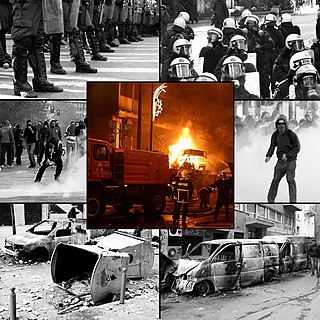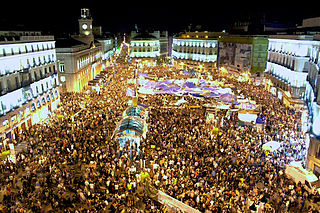Related Research Articles

Beginning in late 2002 and continuing after the 2003 invasion of Iraq, large-scale protests against the Iraq War were held in many cities worldwide, often coordinated to occur simultaneously around the world. After the biggest series of demonstrations, on February 15, 2003, New York Times writer Patrick Tyler claimed that they showed that there were two superpowers on the planet: the United States and worldwide public opinion.

A police riot is a riot carried out by the police; more specifically, it is a riot that police are responsible for instigating, escalating or sustaining as a violent confrontation. Police riots are often characterized by widespread police brutality, and they may be done for the purpose of political repression.

On 15 February 2003, a coordinated day of protests was held across the world in which people in more than 600 cities expressed opposition to the imminent Iraq War. It was part of a series of protests and political events that had begun in 2002 and continued as the invasion, war, and occupation took place. The day was described by social movement researchers as "the largest protest event in human history".
On 20 March 2003, the day after the invasion of Iraq had begun, thousands of protests and demonstrations were held around the world in opposition to it. In many cases, these protests were known as "Day X" protests, reflecting the fact that they had been organized to occur when war started, whatever day that might have been. At least 350,000 people participated. The previous protests in February had been substantially larger.

The Great American Boycott, also called the Day Without an Immigrant, was a one-day boycott of United States schools and businesses by immigrants in the United States which took place on May 1, 2006.

The 2008 Greek rebellion started on 6 December 2008, when Alexandros Grigoropoulos, a 15-year-old Greek student, was killed by a special officer in Exarcheia district of central Athens. The killing of the young student by police resulted in large protests and demonstrations, which escalated to widespread rioting, with numerous rioters damaging property and engaging riot police with Molotov cocktails, stones and other objects. Demonstrations and rioting soon spread to several other cities, including Thessaloniki, the country's second-largest city, and international cities in solidarity. Newspaper Kathimerini called the rioting "the worst Greece has seen since the restoration of democracy in 1974".
The 2009 May Day protests were a series of international protests that took place across Europe, Asia and in the other parts of the world due to the 2007–2008 financial crisis and the resulting Great Recession. Several May Day marches, which are traditional events, had turned violent in Germany, Turkey and Venezuela as riot police battled protesters in their respective countries. Banks and shops had been attacked in Turkey.
James Peck was an American activist who practiced nonviolent resistance during World War II and in the Civil Rights Movement. He is the only person who participated in both the Journey of Reconciliation (1947) and the first Freedom Ride of 1961, and has been called a white civil rights hero. Peck advocated nonviolent civil disobedience throughout his life, and was arrested more than 60 times between the 1930s and 1980s.
Beginning on March 19, 2011, and continuing through the 2011 military intervention in Libya, anti-war protests against military intervention in Libya were held in many cities worldwide.

The anti-austerity movement in the United Kingdom saw major demonstrations throughout the 2010s in response to Conservative-Liberal Democrat coalition government's austerity measures which saw significant reductions in local council budgets, increasing of university tuition fees and reduction of public spending on welfare, education, health and policing, among others. Anti-austerity protests became a prominent part of popular demonstrations across the 2010s, particularly the first half of the decade.
International demonstrations and protests relating to the Syrian Civil War have taken place outside Syria during the war.
The 2012 May Day protests were a series of international protests that took place worldwide on 1 May 2012 over the then ongoing global economic crisis.

International Workers' Day, also known as Labour Day in some countries and often referred to as May Day, is a celebration of labourers and the working classes that is promoted by the international labour movement and occurs every year on 1 May, or the first Monday in May.
The 2014 May Day protests were a series of international protests involving millions of people that took place worldwide on May Day over the ongoing global economic crisis including austerity measures and poor working conditions.

The anti-austerity movement in Spain, also referred to as the 15-M Movement, and the Indignados Movement, was a series of protests, demonstrations, and occupations against austerity policies in Spain that began around the local and regional elections of 2011 and 2012. Beginning on 15 May 2011, many of the subsequent demonstrations spread through various social networks such as Real Democracy NOW and Youth Without a Future.

The anti-austerity movement in Greece involved a series of demonstrations and general strikes that took place across the country. The events, which began on 5 May 2010, were provoked by plans to cut public spending and raise taxes as austerity measures in exchange for a €110 billion bail-out, aimed at solving the Greek government-debt crisis. Three people were killed on 5 May in one of the largest demonstrations in Greece since 1973.
The 2018–2019 Bangladesh protests, also known as the Bangladeshi Social Revolution, was a series of public social unrest and Strike actions by Garment workers and Trade unions against low wages and high unemployment and demanded the resignation of the government. Over 50,000 protesters participated in the nonviolent movement. Anti-wages and anti-fee hike demonstrations loomed in Factories and Company buildings in Ashulia and Rajshahi, where most protesters staged their protest and sit-ins. Dhaka and other minor areas with factories experienced massive increasingly violent and severe street demonstrations while growing street opposition. Civil disobedience and massive labour unrest rocked the country as Garment workers and Farmers demonstrated nationwide against the results of the 2018 Bangladeshi general election, the ousting and sacking of workers in Factories, harsh working conditions and deteriorating wage conditions. Police brutality and deadly clashes was met at protest movement sites and many people were killed in the strikes and Nonviolent resistance and Civil resistance movement at towns and regions nationwide. The protests was suppressed by the military on 13 January, 2019 after a wave of crackdowns for 7 days and clampdowns on the 2018 Bangladesh election violence. The result of the massive movement was mobs were arrested and 1500+ workers are sacked.
The 2021 Greek protests broke out in response to a proposed government bill that would allow police presence on university campuses for the first time in decades, for which opposition groups accused the government of taking advantage of the COVID-19 lockdown to impose increasingly authoritarian measures. Protests intensified in response to the hunger strike of the prisoner Dimitris Koufontinas, a former member of terrorist organization 17N, who had started the strike in December, demanding his transfer to a different prison after he had been forcibly relocated to a maximum-security facility in central Greece, as well as issues relating to police brutality and specifically the DELTA Force motorcycle police.
The 2021-2022 Iranian protests erupted on 15 July 2021 to protest the water shortages and crisis, but were quickly met with police violence and brutality. "Bloody Aban", November 2021 saw further protests due to water shortages but various other protests and strikes also took place due to the worsening economic situation. In August 2021, Amnesty International noted that brutal forces have been used by the Security Forces to oppress the protesters.
References
- 1 2 3 4 "Workers rally for better conditions on May Day". USA Today . 1 May 2013. Retrieved 1 May 2013.
- ↑ Sijabat, Ridwan Max (1 May 2013). "All quiet on the May Day front". The Jakarta Post. Retrieved 1 May 2013.
- ↑ "May Day protest at Speakers' Corner draws thousands". Yahoo. 1 May 2013. Retrieved 1 May 2013.
- ↑ "640_Mac1262". May 2013.
- ↑ "May Day 2013 in Greece: Large strike demonstrations by PAME in Athens and Thessaloniki". Revolution Now!. 1 May 2013. Archived from the original on 24 August 2013. Retrieved 1 May 2013.
- ↑ Wearden, Graeme (1 May 2013). "May Day rallies across Europe as Greek workers strike - as it happened". The Guardian. Retrieved 1 May 2013.
- ↑ "Dos detenidos en la manifestación alternativa del 1 de mayo en Barcelona". La Vanguardia (in Spanish). 2 May 2013. Retrieved 5 April 2014.
- ↑ "May Day demonstrators across U.S. demand immigration reform". CBS News. 1 May 2013. Retrieved 1 May 2013.
- ↑ "May Day rally turns violent in Seattle". USA Today. 2 May 2013. Retrieved 2 May 2013.